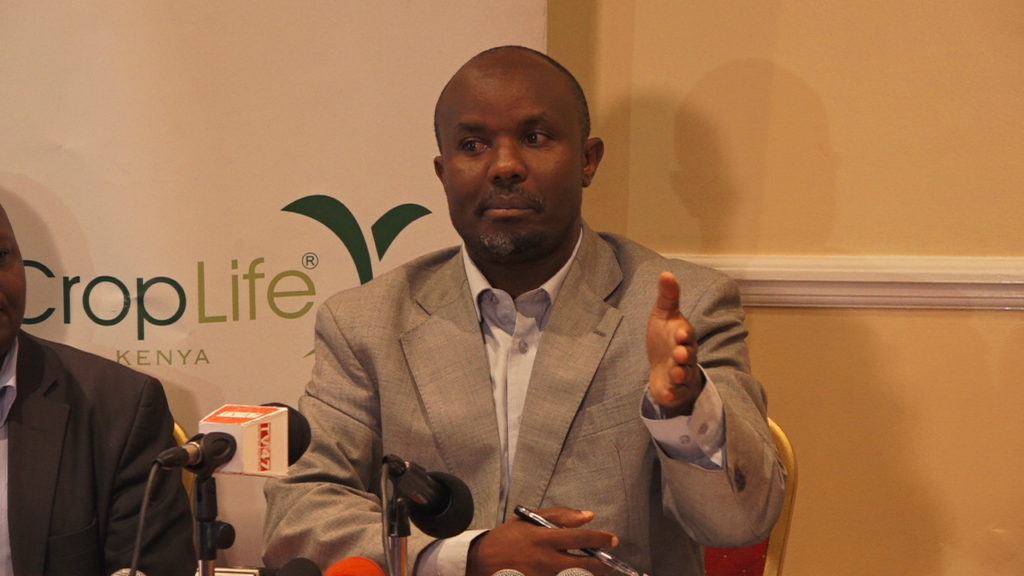By Roseleen Nzioka
Kenya’s pesticide legislation is set for an upgrade that will raise the bar for the approval and use of pesticides in the country. An alliance of agricultural industry stakeholders has announced its support for proposed government legislation updating the Kenyan regime for the approval and use of pesticides.
The Agrochemicals Association of Kenya (AAK), Fresh Produce Consortium (FPC), Cereal Growers Association (CAG), and Veterinary Inputs Suppliers Association of Kenya (VISAK), recently announced their support for the updating of the pesticide control regime, which they termed the most rigorous in Africa.
The new law and regulations add extra requirements for proof of compliance with global laws and in local efficacy data. They also raise the bar on the scientific qualifications needed to run a pest control product business or store and make stock records mandatory.
In addition, the new regulations move Kenya to the global system of hazard labeling on chemicals and add clauses suspending import permits where a pest control product is shown to be harming human health.
The new confidential business information (CBI) regulation requires that the regulator respects the confidentiality of business-sensitive information, while pesticide container disposal is enhanced by introducing Empty Pesticide Collection Centres.
The new law and seven new regulations to upgrade Kenya’s globally benchmarked Pesticide Control Products (PCP) Act will maintain the world’s best risk protection for Kenyans, the agricultural industry alliance said at a press conference in Nairobi.
“The new legislation, spanning a new Pesticides Bill and seven new regulations, will further strengthen Kenya’s rigorous pesticide control, which already prevents any pesticide from being sold in Kenya that has been banned as a health hazard or pollutant under the international Rotterdam or Stockholm Conventions, to which Kenya is a signatory,” said Mr. Eric Kimunguyi, CEO of Agrochemicals Association of Kenya.

The new legislation will create an independent Pesticide Control Products Authority; upgrade the qualifications needed to run businesses and premises handling pesticides; make pesticide stock records compulsory, and move the labeling on pesticides sold in Kenya to the global system of hazard warnings, called the Global Harmonised System of Hazard Warnings.
The bill also recognizes and spells out counties governments’ responsibilities in training farmers in the responsible use (RU) of pesticides.
Where a pesticide is already registered and new scientific evidence emerges that prompts a ban by any one country or regulator, the existing PCP Act automatically triggers a local review and re-registration procedure in Kenya. The outcome from that review is then based on the strength of the scientific evidence.
“However, if scientific evidence is strong enough to prompt a ban under the global conventions governing dangerous chemicals, Kenya will automatically ban the product and issue a phase-out plan,” said Mr. Kimunguyi.
AAK, which represents the pesticide industry, is due to engage with regulators on the updating of the PCP legislation together with agricultural growers including the Fresh Produce Consortium of Kenya.
“Pesticides are critical to our food production, with Fall Army Worm last year destroying 70 percent of our maize production in the absence of a pesticide regime, and international research showing that pesticides increase food production by an average 40 percent,” said Mr. Okisegere Ojepat, CEO of Fresh Produce Consortium of Kenya.
“The urgent matter is to now complete the legislative process and move swiftly to a fully updated expert regulatory regime that will continue to ban pesticides in Kenya that have been internationally banned on health grounds,” said Mr. Kimunguyi.
Summary of Kenya’s pesticide regulation
The 1982 Pest Control Product (PCP) Act created:
A Pest Control Products Board (PCPB) whose functions include:
Assessing pest control products in line with the Act and regulations;
Recommending the registration of pest control products and advising the Minister of Agriculture on the enforcement of the Act and regulations.
A set of six regulations:
Pest control products (licensing of premises) regulations
Pest control products (registration) regulations
Pest control products (labeling, advertising, and packaging) regulations
Pest control products (importation and exportation) regulations
Pest control products (disposal) regulations
Pest control products (license fees and other charges) regulations
The proposed Pest Control Product (PCP) Bill aims to create:
An independent Pest Control Products Authority to regulate the sector
A PCPA board of director to formulate policies and oversee regulation
A tribunal to hear appeals on registration and pest control product regulation.
A set of seven regulations:
Pest control products (registration) regulations, 2018
Pest control products (licensing of premises and business) regulations, 2018
Pest control products (labeling, advertising, and packaging) regulations, 2018
Pest control products (importation and exportation) regulations, 2018
Pest control products (license fees and other charges) regulations, 2018
Pest control products (disposal) regulations, 2018
Confidential business information regulations, 2018














